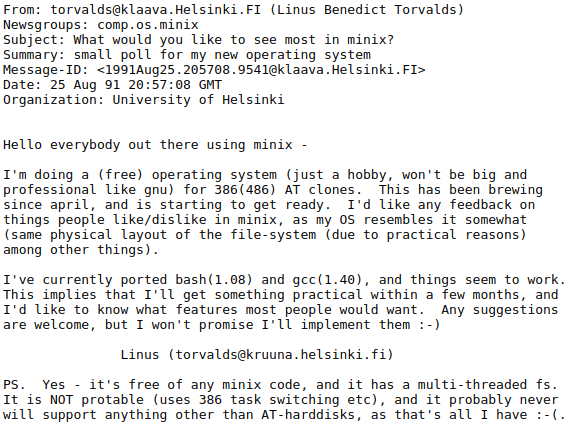Happy birthday – 30 Years of Linux
robgibbon
on 25 August 2021

Won’t be big
Thirty years ago today, Linus Torvalds announced his free operating system to the world. As with many of the world’s greatest, Linux had humble beginnings as a very small pet project. The GNU was working on an ambitious free, public domain operating system but the project had been delayed, and enthusiasts were quick to adopt Linus’ new project. Over the years Linux has grown into a globally available, free software base that has remained largely resilient to interference from individual governments, corporations, and academic institutions. Linux enhances the lives of billions of people around the world, running in everything from server computers to smartphones, to embedded devices.
Today we celebrate thirty years of Linux and the worldwide free, open source software movement that has developed and grown along with the operating system; and we make a toast to Linus and the thing that he started. Happy birthday Linux!
Canonical’s philosophy and values have always aligned with the ethos of collaboration, sharing, cooperation and humanity that are epitomised by Linux, and we reaffirm our long term commitment to not only Linux but the principles of open source software, accessibility and collaboration for the common good. Collaboration, sharing and cooperation are the values encapsulated in the meaning of the word Ubuntu.
Why Linux was groundbreaking
By adopting the GPL license, a free software license that essentially commits participating developers to grant their contributions to the Linux project into the public domain, the Linux operating system was able to successfully build up a complete, if at times discoherent platform. The Linux platform offers, for many users, power and flexibility with comparable or better features than proprietary solutions. Indeed, many other operating systems owe a great deal of their inspiration if not their codebase to the GNU/Linux project.
Relying on a vast army of volunteer contributors from across the world, from the ranks of commerce, research, academia and government, Linux has grown to sit at the top table of computing over the past thirty years. It has arguably become an iconic emblem for human achievement.
By gifting a mature, comprehensive, freely available and freely adaptable software base to the world, Linus and his project have granted us all a powerful and resilient resource for the future, regardless of what the future may bring.
Thirty, flirty, and thriving
Linux is an asset for the whole of humanity. Canonical, as with other key sponsors, has a duty to assure the long term health of the project. Today we are restating our commitment to helping assure that Linux and the free software community remains a healthy, diverse and vibrant force for good for many years to come.
Many happy returns, Linux!
Talk to us today
Interested in running Ubuntu in your organisation?
